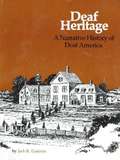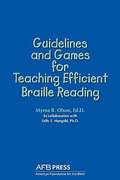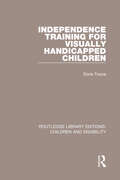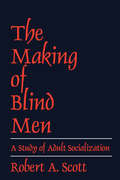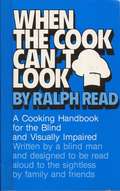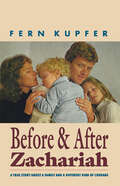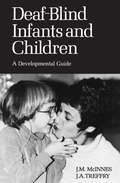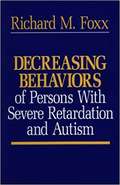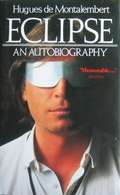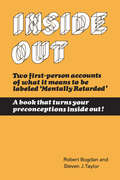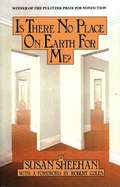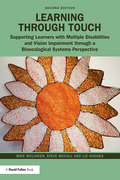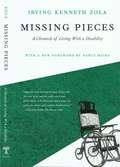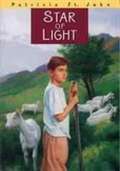- Table View
- List View
Deaf Heritage: A Narrative History of Deaf America
by Jack GannonThis in-depth history of Deaf America begins with an overview of the early years. Each chapter then covers a decade of history, beginning with 1880. The text is supplemented by marvelous pictures, illustrations, vignettes and biographical profiles. "Subchapters" chronicle the multi-facited dimensions of Deaf culture by focusing on Deaf athletes and more. A complete Deaf Culture course!
Guidelines and Games for Teaching Efficient Braille Reading
by Sally S. Mangold Myrna R. OlsonThese unique guidelines and games provide ideas for adapting a general reading program to the needs of braille readers and enriching early instruction in braille that are based on research in the areas of rapid reading and precision teaching. Classroom teachers and anyone working with children who are blind or visually impaired will find this classic handbook an invaluable resource.
Independence Training for Visually Handicapped Children
by Doris ToozeFirst published in 1981, this book was written to help parents and teachers to participate in child-based mobility programmes, covering the needs of visually-handicapped children from pre-school to adulthood. It gives insight into ways in which these figures can make the world meaningful to young children, as well as making them aware of the special training that is necessary to develop the social skills of daily living that a sighted child acquires through imitation. Travel techniques must be learnt to enable these children to move independently and the book describes various methods that can be used by the blind traveller. It also examines the role of physical education and dance, both of particular importance for the visually-handicapped child at school age.
Recreation Programming for Visually Impaired Children and Youth
by Jerry D. KelleyThe book is designed primarily for the recreation consultant or trainer concerned with assisting the community recreation leader in his or her efforts to provide recreation programs and services for the visually impaired child.
Skychild
by Suzanne MorrisAt two, Ian Maguire is both a beautiful and very gifted little boy, a child that his parents, Monica and Forrest, are justifiably proud of. But Ian is special in other ways. Increasingly unresponsive to the world around him, he is content only when alone, rocking in his crib or playing obsessively with his favorite toy, a pocket mirror of his mother's. Forrest, preoccupied with his high- pressure job, refuses to see anything unusual about his son's behavior, and retreats ever further into his work. Monica, more anxious than even she will admit, finally takes Ian to be tested. The results are shattering. Her son, the doctors tell her, is probably autistic, certainly psychotic, and there is little hope of improvement. Confirming her deepest fears, the diagnosis plunges Monica into an agony of uncertainty and guilt. Is Ian's sickness the consequence of Forrest's remoteness, or must she now reveal a secret about Ian's birth she has kept even from her husband? Confused, her marriage coming apart, Monica sets out to find her own answers. She takes Ian to Galveston Bay, to a place she knew as a child, and, in a startling climax, she discovers the love and understanding they have both needed so badly.
Somebody Else's Kids: They Were Problems No One Wanted ... Until One Teacher Took Them to Her Heart
by Torey L. HaydenThey were all "just somebody else's kids"-four problem children placed in Torey Hayden's class because nobody knew what else to do with them. They were a motley group of children in great pain: a small boy who echoed other people's words and repeated weather forecasts; a beautiful seven year old girl brain damaged by savage parental beatings; an angry and violent ten year old who had watched his stepmother murder his father; a shy twelve year old who had been cast out of Catholic school when she became pregnant. But they shared one thing in common: a remarkable teacher who would never stop caring-and who would share with them the love and understanding they had never known to help them become a family.
Tess: The Story of a Guide Dog
by Peter PurvesThe raising of a guide dog in the United Kingdom. Readers will enjoy the adventures that Tess has, from running away, to eating all sorts of things, and digging up all the flowers. A delightful book for all ages.
The Making of Blind Men
by Robert A. ScottThe disability of blindness is a learned social role. The various attitudes and patterns of behavior that characterize people who are blind are not inherent in their condition but, rather, are acquired through ordinary processes of social learning. The Making of Blind Men is intended as a systematic and integrated overview of the blindness problem in America. Dr. Scott chronicles which aspects of this problem are being dealt with by organizations for the blind and the effectiveness of this intervention system. He details the potential consequences of blind people becoming clients of blindness agencies by pointing out that many of the attitudes, behavior patterns, and qualities of character that have been assumed to be given to blind people by their condition are, in fact, products of socialization. As the self-concepts of blind men are generated by the same processes of socialization that shape us all, Dr. Scott puts forth the challenge of reforming the organized intervention system by critically evaluating the validity of blindness workers' assumptions about blindness and the blind. It is felt that an enlightened work force can then render the socialization process of the blind into a rational and deliberate force for positive change.
The Seeing Summer
by Jeannette Eyerly Emily Arnold McCullyMore than anything else Carey wants a new ten-year-old playmate to replace the friend who had moved away. When she hears that the new family next door has a girl her own age, Carey straightens her room and settles down to watch and wait. She is stunned to learn that her new young neighbor is blind and carries a white cane. Not fair! Jenny will not be able to do everything Carey can do. But Carey is in for a surprise—Jenny can cook, play games, read her own books, and run outdoors like everyone else. When two thugs kidnap Jenny for a high ransom, Carey tracks them down and becomes a second captive. Together the girls keep up their courage and use their ingenuity to survive the terrifying adventure. The Seeing Summer is a story of capture and escape, but best of all it is a story of friendship between two ten-year-olds who are very much alike, even though one cannot see.
When the Cook Can't Look: A Cooking Handbook for the Blind and Visually Impaired
by Ralph Read<P>This cooking handbook, designed to be read to the blind and visually impaired by a relative or friend, is written by one who is most qualified-- a blind person. <P>Ralph Read lost his sight in adulthood and now, from personal experience, makes available to other sightless individuals his innovative, sensible and safe methods for coping in the kitchen.
A Cup of Christmas Tea
by Tom HeggA nephew's visit to an elderly great aunt at Christmastime brings him memories of past holidays and the realization of how the human spirit can triumph over adversity.
A Teachers' Guide to the Special Educational Needs of Blind and Visually Handicapped Children
by Sally S. MangoldSuggestions and ideas from educational officials on how to provide additional support to blind students in the classroom setting.
Before & After Zachariah: A True Story About a Family and a Different Kind of Courage
by Fern KupferThe heart-wrenching story of one couple's courageous decision to have their severely brain-damaged son cared for in a residential facility.
Deaf-Blind Infants and Children
by John Mcinnes J. A. TreffryThis is a comprehensive reference guide for teachers, parents, and paraprofessionals working or living with children who are both deaf and blind. It provides day-to-day guidance and suggestions about techniques and methods for assessing children with multi-sensory deprivation, and for devising programs to help them cope.
Decreasing Behaviors Of Persons With Severe Retardation And Autism
by Richard M. FoxxThis widely used manual shows how to increase desirable behaviors by using techniques such as shaping, prompting, fading, modeling, backward chaining, and graduated guidance. It offers specific guidelines for arranging and managing the learning environment as well as standards for evaluating and maintaining success. Exercises, review questions, and numerous examples are included. The book is written for special educators, aides, residential staff, and those responsible for designing or evaluating behavioral programs. Often adopted as a supplementary college text.
Eclipse: An Autobiography
by Hugues De Montalembert David NoakesUp until 1978, the author, a French count by birth, was a painter. He travelled extensively working on documentary films such as I A Dancer about Rudolph Nureyev and Margot Fonteyn. He took a deep interest in the culture of the countries he visited: the harlem voodoo in West Africa and Indonesian music in Bali. On May 25th 1978, when returning to his apartment in New York from a Greenwich Village coffee-house, he was met by two intruders who threw caustic solution in his face. At the age of thirty-five he was blinded for life. Hugues de Montalembert is currently based in Rome although he continues to travel between Europe, America and South East Asia. The French edition of ECLIPSE became a bestseller when it was published in 1982 and the author is currently working on his second book.
Emma's Story
by Sheila HockenFrom the Book Jacket: SPRING DIGGING It was lovely helping Paddy in the garden. Digging up weeds -I gave her a helping paw there watching her put things in. After lunch Paddy said she'd put in everything she wanted to, and was now going to do some baking in the kitchen, but as it was quite sunny I could stop out in the garden. I went round again sniffing all the things she'd buried. Perhaps she'd left them there and wanted to get them out later, like I did sometimes with bones? If I did that for her now it would save her such a lot of time. So I went round and dug them all up. It took me ages. There were about a hundred. Won't she be pleased, I thought, when she knows I found every one and brought them all back for her? It wasn't long before she opened the door. 'Emma, come on in, it's teatime. ' Then she spotted the bulbs. I sat there looking pleased with myself. But she suddenly started laughing. 'Oh Emma... no. What have you done?' 'My name is Emma and I'm a chocolate-coloured labrador. Most other labradors are black or yellow, but not only am I a very special colour, I used to be a very special dog. I used to be a guide dog--and that isn't something any dog can do. So I'm going to tell you how to be a guide dog, right from the beginning, from when I was a puppy.' EMMA & I and EMMA V.I.P. have made Emma a very famous guide dog indeed. Now Sheila Hocken tells the full story of Emma's training from Emma's point of view This really is Emma's story, a book as lovable and lively as Emma herself.
Greff: The Story of a Guide Dog
by Patricia CurtisGreff, a big yellow Labrador retriever, was destined to be a guide dog. Follow Greff from the night of his birth, through his experiences with his puppy raisers, to the time he returns to the Guide Dog Foundation for training, and to the day that Greff and his new owner graduate and go home.
Inside Out: The Social Meaning of Mental Retardation
by Steven J. Taylor Robert Bogdan Seymour B. Sarason'We have to assume that the mind is working no matter what it looks like on the outside. We can't just judge by appearance...If you take away the label they are human beings.' Ed MurphyWhat does it mean to be 'mentally retarded'? Professors Bogdan and Taylor have interviewed two experts, 'Ed Murphy' and 'Pattie Burt,' for answers. Ed and Pattie, former inmates of institutions for the retarded, tell us in their own words.Their autobiographies are not always pleasant reading. They describe the physical, mental, and emotional abuses heaped upon them throughout their youth and young adulthood; being spurned, neglected, and ultimately abandoned by family and friends; being labelled and stigmatized by social service professionals armed with tests and preconceptions; being incarcerated and depersonalized by the state.Ed and Pattie survived these experiences--evidence, perhaps, of the indefatigable will of the human spirit to assert its essential humanity--but the wounds they have suffered, and the scars they bear, have not been overcome. They are now contributing, independent, members of society, but the stigma of 'mental retardation' remains.Their stories are both true and representative--powerful indictments of our knowledge of, our thinking about, and our ministrations to, the mentally handicapped. The interviewers argue that Ed and Pattie challenge the very concept of 'mental retardation.' Retardation, they assert, is an 'imaginary disease'; our attempts to 'cure' it are a hoax.Read Ed's and Pattie's accounts and judge for yourself.
Is There No Place on Earth for Me?
by Susan SheehanSylvia Frumkin a highly intelligent young girl became a schizophrenic in her late teens and spent most of the next seventeen years in and out of mental institutions. Susan Sheehan followed Sylvia for almost a year, talking with and observing her.
Learning through Touch: Supporting Learners with Multiple Disabilities and Vision Impairment through a Bioecological Systems Perspective
by Mike Mclinden Steve Mccall Liz HodgesThis fully revised and updated second edition of Learning through Touch is essential reading for practitioners who support learners with multiple disabilities and vision impairment. These learners will rely on support from their learning partners throughout their education to mediate their learning experiences. The text explores the key role that touch plays in the education of these learners and provides practical advice about how to develop the skills through touch that they will need to become ‘active agents’ in their own development. The book reflects international initiatives that seek to ensure that people with disabilities have opportunities to take meaningful control within their learning and their lives. Key features include: Chapters that support curriculum access for learners with visual impairments; Reflections on up-to-date research studies and guidance for further reading throughout, allowing for a strong conceptual foundation for practice; Portfolio activities designed to help implement effective learning opportunities within your own practice. Written to assist teachers and other professionals who support children with visual impairment and additional difficulties, this text will appeal to professionals and students alike. It is an invaluable resource for anyone looking to explore the role of touch in creating effective learning experiences.
Look At Me: A Resource Manual for the Development of Residual Vision in Children with Multiple Disabilities
by Audrey J. Smith Karen Shane CoteLook at me is a complete resource for educators working with visually/multiply handicapped as well as those having low vision as their only disability. It provides the reader with basic, written information on the structure and function of the eye.
Missing Pieces: A Chronicle of Living With a Disability
by Irving Kenneth Zolahe personal odyssey of a man with a disability, this passionate book tries to tell as well as analyze what it is like to have a disability in a world that values vigor and health. Zola writes, "Missing Pieces is an unraveling of a social problem in the manner of Black Like Me. Like its author, I, too, am a trained social observer, but for me 'passing' was not an issue. For I already have the stigmata of the disable - the braces, the limp, the cane - though I have spent much of my life denying their existence." The author started out in the role of a social scientist on a seven-day excursion to acquaint himself with an extraordinary experiment in living - Het Dorp, one of the few places in the world designed to promote "the optimum happiness" of those with severe physical disabilities. Neither a medial center nor a nursing home, Het Dorp is a village in the western-most part of the Netherlands. What began as a sociological attempt to describe this unusual setting became, through the author's growing awareness, what can only be called a socio-autobiography. Resuming his prior dependence on a wheelchair, the author experienced his own transformation from someone who is "normal" and "valid" to someone who is "invalid." The routine of Het Dorp became his: he lived in an architecturally modified home, visited the workshops, and shared meals, social events, conversation, and perceptions with the remarkably diverse residents. The author confronts some rarely discussed issues - the self-image of a person with a chronic disability, how one fills one's time, how one deals with authority and dependence, and love and sex. Missing Pieces offers striking insights into an aspect of the human condition shared by nearly 30 million Americans. It is must reading for the general reader, as well as for the rehabilitation counselor, social worker, or social scientist. Author note: Irving Kenneth Zola (1935-1994) was Professor of Sociology at Brandeis University and a founding member and counselor at the Boston Self-Help Center. Nancy Mairs is the author of seven books, including Waist-High in the World: A Life Among the Disabled, and most recently, A Troubled Guest: Life and Death Stories. She lives in Tucson with her husband, George.
Star of Light
by Patricia St. JohnHamid's blind sister, Kinza is about to be sold to a beggar by their stepfather. Hamid must rescue Kinza and escape from their mountain village to safety.
The Ceres Solution
by Bob ShawDenny Hargate, wheelchair-bound and embittered, has his life changed when he meets a beautiful woman in an out-of-the-way place called Cotter's Edge.
